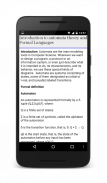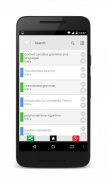









Automata theory

Beschreibung von Automata theory
Automata theory is the study of abstract machines and automata. It is a theory in theoretical computer science, & discrete mathematics. Automata comes from the Greek word αὐτόματα meaning "self-acting".
The app is classroom notes on the subject for Information technology (IT), Computer Science engineering, discrete mathematics & Mathematics students.
The purpose of the App is faster learning of the subject and quick revisions of the topics. The Topics are created in manner to quickly absorb the subject.
It covers 138 topics of Automata in detail. These 138 topics are divided in 5 units.
Some of topics Covered in this application are:
1. Introduction to automata theory and Formal Languages
2. Finite automata
3. Deterministic finite state automaton (DFA)
4. Sets
5. Relations and Functions
6. Asymptotic Behavior of Functions
7. Grammar
8. Graphs
9. Languages
10. Nondeterministic finite automaton
11. Strings and Languages
12. Boolean Logic
13. Orders for Strings
14. Operations on languages
15. Kleene Star, ‘∗’
16. Homomorphism
17. Machines
18. The power of DFAs
19. Machine types that accept non-regular languages
20. Equivalence of NFA and DFA
21. Regular Expressions
22. Regular Expressions and Languages
23. Building Regular Expressions
24. NFAs to Regular Expression
25. Two-way Finite Automata
26. Finite Automata with Output
27. Properties of regular sets (Languages)
28. Pumping Lemma
29. Closure properties of regular languages
30. Myhill-Nerode Theorem-1
31. Introduction to Context-Free Grammars
32. Conversion of Left-linear Grammar into Right-Linear Grammar
33. Derivation Tree
34. Parsing
35. Ambiguity
36. Simplification of CFG
37. Normal Forms
38. Greibach Normal Form
39. Pushdown Automata
40. Transition Functions for NPDA
41. Execution of NPDA
42. Relation between pda and context free language
43. CFG to NPDA
44. NPDA to CFG
45. Properties of context-free languages
46. Proof of Pumping Lemma
47. Usage of Pumping Lemma
48. dicision Algorithms
49. Turing Machine
50. Programming a Turing Machine
51. Turing Machines as Transducers
52. Complete language and functions
53. Modification of turing machines
54. Church-turing thesis
55. Enumerating Strings in a Language
56. Halting Problem
57. Rice's Theorem
58. Context sensitive grammar and languages
59. The chomsky hirarchy
60. Unrestricted grammar
61. Introduction to Complexity Theory
62. polynomial time algorithm
63. boolean satisfiablity
64. Additional NP problem
65. Formal systems
66. Composition and recursion
67. Ackermann's theorem
68. Propositions
69. Exampleof Non Deterministic Finite Automata
70. Conversion of NFA to DFA
71. Connectives
72. Tautology, Contradiction and Contingency
73. Logical Identities
74. Logical inference
75. Predicates and quantifiers
76. Quantifiers and logical operators
77. Normal forms
78. Mealy and moore Machine
79. Myhill-Nerode theorem
80. Decision algorithms
81. NFA with ε-moves
82. Binary Relation Basics
83. Transitive, and Related Notions
84. Equivalence (Preorder plus Symmetry)
85. The Power Relation between Machines
86. Dealing with Recursion
87. The Y operator
88. The least fixed-point
89. Error-correcting DFAs
90. Ultimate Periodicity and DFAs
91. The Automaton/Logic Connection
92. Binary Decision Diagrams (BDDs)
93. Basic Operations on BDDs
94. Stabilization at a Fixed-Point
95. A Taxonomy of Formal Languages and Machines
96. Introduction to Push-down Automata
97. Right- and Left-Linear CFGs
98. Developing CFGs
99. A Pumping Lemma for CFLs
100. A Pumping Lemma for CFLs
101. Acceptance, Halting, Rejection
102. NDTMs
IMPORTANT LINKS
Feedback: Share your feedback at essyengineering@gmail.com
Social links
Facebook : https://www.facebook.com/EngineeringEasy/
Twitter : https://twitter.com/easyengineerin
Website:http://www.engineeringapps.net/
</div> <div jsname="WJz9Hc" style="display:none">Automata Theorie ist die Untersuchung der abstrakten Maschinen und Automaten. Es ist eine Theorie der theoretischen Informatik, und diskrete Mathematik. Automata kommt aus dem griechischen Wort αὐτόματα "selbsttätig" bedeutet.
Die App ist Klassenzimmer Hinweise zum Thema Informationstechnologie (IT), Informatik-Engineering, diskrete Mathematik und Mathematik-Studenten.
Der Zweck der App ist ein schnelles Lernen des Themas und die schnellen Änderungen der Themen. Die Themen werden in Art und Weise geschaffen, um schnell das Thema zu absorbieren.
Es umfasst 138 Themen von Automata im Detail. Diese 138 Themen werden in fünf Einheiten unterteilt.
Einige der Themen in dieser Anwendung werden behandelt:
1. Einführung Theorie und formale Sprachen zu Automaten
2. Endliche Automaten
3. deterministischen endlichen Automaten (DFA)
4. Sets
5. Beziehungen und Funktionen
6. asymptotische Verhalten von Funktionen
7. Grammatik
8. Graphs
9. Sprachen
10. Nichtdeterministische endlichen Automaten
11. Streicher und Sprachen
12. Boolesche Logik
13. Aufträge für Streicher
14. Operationen auf Sprachen
15. Kleene Star, à ¢ â,¬ËœÃ ¢ Ë † â € "à ¢ â, ¬ â" ¢
16. Homomorphismus
17. Maschinen
18. Die Kraft der DFAs
19. Maschinentypen, die nicht reguläre Sprachen akzeptieren
20. Gleichwertigkeit der NFA und DFA
21. Regular Expressions
22. Reguläre Ausdrücke und Sprachen
23. Gebäude Regular Expressions
24. NFAs zu Regular Expression
25. Zwei-Wege-Finite Automata
26. Finite Automata mit Ausgang
27. Eigenschaften von regulären Sets (Sprachen)
28. Pumping Lemma
29. Abschlusseigenschaften regulärer Sprachen
30. Myhill-Nerode Satz-1
31. Einführung in die kontextfreien Grammatiken
32. Umwandlung von links lineare Grammatik in der rechten Linear Grammatik
33. Derivation Tree
34. Parsing
35. Mehrdeutigkeit
36. Vereinfachung der CFG
37. Normalformen
38. Greibach-Normalform
39. Kellerautomaten
40. Übergangsfunktionen für NPDA
41. Durchführung von NPDA
42. Die Beziehung zwischen pda und kontextfreie Sprache
43. CFG NPDA
44. NPDA zu CFG
45. Eigenschaften von kontextfreien Sprachen
46. Beweis von Lemma Pumping
47. Verwendung von Lemma Pumping
48. dicision Algorithmen
49. Turing-Maschine
50. Programmieren einer Turing-Maschine
51. Turingmaschinen als Transducer
52. Vollständige Sprache und Funktionen
53. Änderung von Turing-Maschinen
54. churchsche These
55. Aufzählen Strings in einer Sprache
56. Halteproblem
57. Satz von Rice
58. kontextsensitive Grammatik und Sprachen
59. Die chomsky Hirarchie
60. Uneingeschränkte Grammatik
61. Einführung in die Komplexitätstheorie
62. Polynomialzeitalgorithmus
63. boolean satisfiablity
64. Zusätzliche NP-Problem
65. Formale Systeme
66. Zusammensetzung und Rekursion
67. Ackermann-Theorem
68. Propositions
69. Exampleof Nicht deterministische Finite Automata
70. Umwandlung von NFA zu DFA
71. Konnektive
72. Tautologie, Contradiction und Kontingenz
73. Logische Identitäten
74. Logische Folgerung
75. Prädikate und quantifiers
76. Quantifiers und logischen Operatoren
77. Normalformen
78. Mealy und Moore-Automaten
79. Myhill-Nerode Theorem
80. Entscheidung Algorithmen
81. NFA mit ÃŽÂμ-Züge
82. Binärrelation Basics
83. Transitive und verwandte Begriffe
84. Equivalence (Preorder und Symmetrie)
85. Die Machtverhältnis zwischen Maschinen
86. mit Rekursion Umgang
87. Der Y-Operator
88. Die am wenigsten Festpunkt
89. Fehler-Korrektur DFAs
90. ultimative Periodizität und DFAs
91. Die Automaton / Logik-Anschluss
92. Binary Decision Diagrams (BDDs)
93. Grundfunktionen auf BDDs
94. Stabilisierung auf Fixed-Point
95. Eine Taxonomie Formale Sprachen und Maschinen
96. Einführung in die Pushdown-Automata
97. rechts- und links Linear CFG
98. Die Entwicklung CFG
99. Ein Lemma Pumping für CFL
100. Ein Lemma Pumping für CFL
101. Die Annahme, Anhalten, Zurückweisung
102. NDTMs
WICHTIGE LINKS
Feedback: Geben Sie uns Feedback zu essyengineering@gmail.com
Social Links
Facebook: https://www.facebook.com/EngineeringEasy/
Twitter: https://twitter.com/easyengineerin
Website: http: //www.engineeringapps.net/</div> <div class="show-more-end">


























